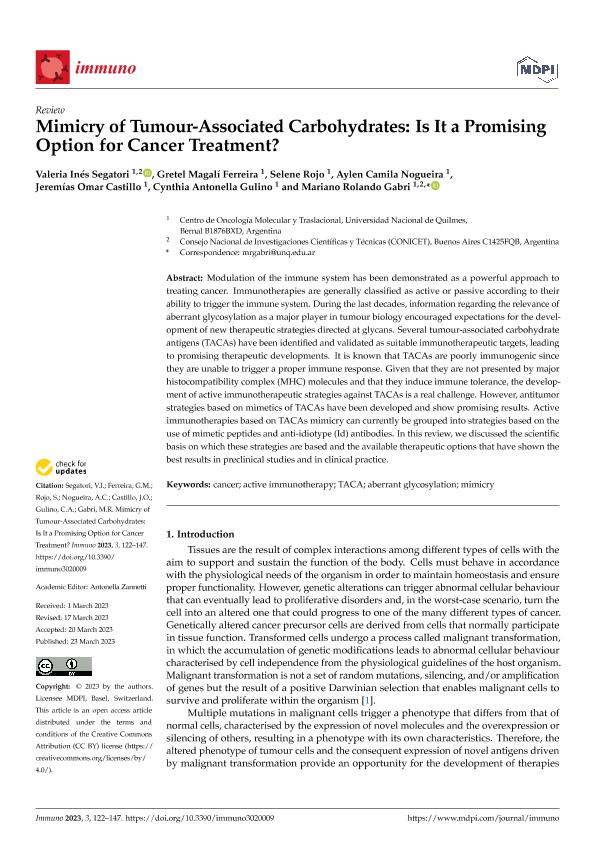Mostrar el registro sencillo del ítem
dc.contributor.author
Segatori, Valeria Inés

dc.contributor.author
Ferreira, Gretel Magalí

dc.contributor.author
Rojo, Selene

dc.contributor.author
Nogueira, Aylen Camila

dc.contributor.author
Castillo, Jeremias Omar

dc.contributor.author
Gulino, Cynthia Antonella

dc.contributor.author
Gabri, Mariano Rolando

dc.date.available
2023-12-13T19:54:49Z
dc.date.issued
2023-03
dc.identifier.citation
Segatori, Valeria Inés; Ferreira, Gretel Magalí; Rojo, Selene; Nogueira, Aylen Camila; Castillo, Jeremias Omar; et al.; Mimicry of Tumour-Associated Carbohydrates: Is It a Promising Option for Cancer Treatment?; Multidisciplinary Digital Publishing Institute; Immuno; 3; 2; 3-2023; 122-147
dc.identifier.uri
http://hdl.handle.net/11336/220254
dc.description.abstract
Modulation of the immune system has been demonstrated as a powerful approach to treating cancer. Immunotherapies are generally classified as active or passive according to their ability to trigger the immune system. During the last decades, information regarding the relevance of aberrant glycosylation as a major player in tumour biology encouraged expectations for the development of new therapeutic strategies directed at glycans. Several tumour-associated carbohydrate antigens (TACAs) have been identified and validated as suitable immunotherapeutic targets, leading to promising therapeutic developments. It is known that TACAs are poorly immunogenic since they are unable to trigger a proper immune response. Given that they are not presented by major histocompatibility complex (MHC) molecules and that they induce immune tolerance, the development of active immunotherapeutic strategies against TACAs is a real challenge. However, antitumor strategies based on mimetics of TACAs have been developed and show promising results. Active immunotherapies based on TACAs mimicry can currently be grouped into strategies based on the use of mimetic peptides and anti-idiotype (Id) antibodies. In this review, we discussed the scientific basis on which these strategies are based and the available therapeutic options that have shown the best results in preclinical studies and in clinical practice.
dc.format
application/pdf
dc.language.iso
eng
dc.publisher
Multidisciplinary Digital Publishing Institute
dc.rights
info:eu-repo/semantics/openAccess
dc.rights.uri
https://creativecommons.org/licenses/by/2.5/ar/
dc.subject
CANCER
dc.subject
ACTIVE IMMUNOTHERAPY
dc.subject
TACA
dc.subject
ABERRANT GLYCOSYLATION
dc.subject.classification
Biotecnología relacionada con la Salud

dc.subject.classification
Biotecnología de la Salud

dc.subject.classification
CIENCIAS MÉDICAS Y DE LA SALUD

dc.title
Mimicry of Tumour-Associated Carbohydrates: Is It a Promising Option for Cancer Treatment?
dc.type
info:eu-repo/semantics/article
dc.type
info:ar-repo/semantics/artículo
dc.type
info:eu-repo/semantics/publishedVersion
dc.date.updated
2023-12-13T12:24:20Z
dc.identifier.eissn
2673-5601
dc.journal.volume
3
dc.journal.number
2
dc.journal.pagination
122-147
dc.journal.pais
Suiza

dc.journal.ciudad
Basel
dc.description.fil
Fil: Segatori, Valeria Inés. Consejo Nacional de Investigaciones Científicas y Técnicas; Argentina. Universidad Nacional de Quilmes. Departamento de Ciencia y Tecnología. Laboratorio de Oncología Molecular; Argentina
dc.description.fil
Fil: Ferreira, Gretel Magalí. Consejo Nacional de Investigaciones Científicas y Técnicas; Argentina. Universidad Nacional de Quilmes. Departamento de Ciencia y Tecnología. Laboratorio de Oncología Molecular; Argentina
dc.description.fil
Fil: Rojo, Selene. Consejo Nacional de Investigaciones Científicas y Técnicas; Argentina. Universidad Nacional de Quilmes. Departamento de Ciencia y Tecnología. Laboratorio de Oncología Molecular; Argentina
dc.description.fil
Fil: Nogueira, Aylen Camila. Universidad Nacional de Quilmes. Departamento de Ciencia y Tecnología. Laboratorio de Oncología Molecular; Argentina
dc.description.fil
Fil: Castillo, Jeremias Omar. Universidad Nacional de Quilmes. Departamento de Ciencia y Tecnología. Laboratorio de Oncología Molecular; Argentina
dc.description.fil
Fil: Gulino, Cynthia Antonella. Universidad Nacional de Quilmes. Departamento de Ciencia y Tecnología. Laboratorio de Oncología Molecular; Argentina
dc.description.fil
Fil: Gabri, Mariano Rolando. Consejo Nacional de Investigaciones Científicas y Técnicas; Argentina. Universidad Nacional de Quilmes. Departamento de Ciencia y Tecnología. Laboratorio de Oncología Molecular; Argentina
dc.journal.title
Immuno
dc.relation.alternativeid
info:eu-repo/semantics/altIdentifier/url/https://www.mdpi.com/2673-5601/3/2/9
dc.relation.alternativeid
info:eu-repo/semantics/altIdentifier/doi/http://dx.doi.org/10.3390/immuno3020009
Archivos asociados
